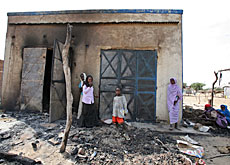
Banks rapped for Darfur “genocide” investments

NGOs have accused several Swiss banks of helping to finance atrocities in Sudan with oil investments that allegedly grease the government's military machine.
A deal by Switzerland’s biggest bank, UBS, to underwrite the Shanghai listing of Chinese oil firm PetroChina has come under particular scrutiny. The banks deny their deals help fund the violence.
Some non-governmental organisations believe that the Sudanese government uses up to 70 per cent of its oil revenues to finance continued violence in conflict-ridden Sudan, particularly in the western province of Darfur. They have called on banks to stop investing in companies that do business in this sector.
The Swiss-based Berne Declaration, the Genocide Intervention Network and the Society for Threatened Peoples on Monday named several Swiss banks with alleged combined investments of SFr7 billion ($6 billion) in such firms.
“They are among the biggest shareholders and investors in oil companies that provide revenue for the Sudanese regime,” Berne Declaration’s Andreas Missbach told swissinfo.
“On environmental issues they realise that they are also responsible for the ecological footprint of their clients. But so far they have not got it in regards to human rights and they are trying to escape the discussion.”
UBS’s involvement in launching PetroChina on the Shanghai stock exchange on November 5 has come under fire as the oil firm is owned by the Chinese National Petroleum Corporation (CNPC) that does business with the Sudanese government.
Bank denies charges
But the bank argues that PetroChina is a separate organisation with no direct dealings with Sudan.
“UBS does not do business with companies in Sudan or those that generate substantial revenues in Sudan,” spokesman Serge Steiner told swissinfo. “PetroChina is an independently listed company and proceeds of its listing in China will only be used in that country.”
However, Scott Wiedmer of Genocide Intervention Network said the bank is deliberately sidestepping the issue.
“This move sends a very clear signal to PetroChina/CNPC that they can have continued access to western financial institutions without establishing even the most minimal standards regarding labour practices, environmental practices and human rights abuses,” he said.
Fighting between Sudanese government troops and rebel groups has killed hundreds of thousands of people and left millions displaced in Darfur since an uprising in 2003, according to the United Nations.
“Hell on earth”
Darfur is the latest crisis point in decades of violence that have devastated the African country since its independence in 1956. Abdelbagi Jibril, permanent NGO representative to the UN in Geneva and a Sudanese national, told swissinfo Darfur was “hell on earth”.
“Genocide has a specific definition that includes killing, destruction of property, forced displacement, rape and abduction. If you go to Darfur you will find all of these atrocities,” he said.
“The government uses the oil revenues not for the development of its people but for its military machinery,” he said. “If they don’t have that constant source of revenue they would have to rethink their handling of the situation and find a peaceful solution.”
swissinfo, Matthew Allen in Zurich
Sudan is Africa’s largest nation and a country of great diversity, gaining independence from British rule in 1956. The region of Darfur alone is larger than France.
The government in Khartoum is dominated by the Islamist National Islamic Front (NIF) regime that came to power in a military coup in 1989.
The country has been embroiled in sporadic internal conflict for most of the last 50 years since independence. The 21-year conflict between mainly Muslim north and the Christian and Animist south ended in 2005, with an autonomous government in the south.
An estimated 1.5 million people died in this conflict, in which southern rebels said they were battling oppression and marginalisation.
The Darfur conflict broke out in 2003 as the north and south were edging towards peace.
Banks named by NGOs with alleged investments in companies with business interests in the Sudanese oil sector:
Credit Suisse $2.8 billion (SFr3.26 billion)
UBS $2.7 billion
Pictet & Cie $221 million
Lombard Odier Darier Hentsch $98 million
Swisscanto Holding $22 million
Vaud Cantonal Bank $15 million

In compliance with the JTI standards
More: SWI swissinfo.ch certified by the Journalism Trust Initiative






























You can find an overview of ongoing debates with our journalists here . Please join us!
If you want to start a conversation about a topic raised in this article or want to report factual errors, email us at english@swissinfo.ch.